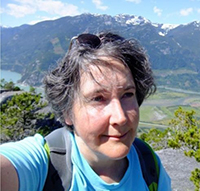
BSc (Simon Fraser); MSc (Simon Fraser) Physical Geography, Biogeography
Office: N3419D (New Westminster), B3166 (David Lam)
Phone: (604) 527-5807, (604) 777-6161 (David Lam)
Fax: (604) 527-5316
Email: smythes@douglascollege.ca
I’ve been interested in the physical environment for as long as I can remember. Childhood summers spent running through waves on the beach, skipping rocks in lakes, walking with family in the forest, and later hiking in the mountains with friends all contributed to a curiosity about the natural world. Until I encountered Geography 12 in high school, I wanted to be the world’s first great woman undersea explorer. But a wonderful Grade 12 teacher made me aware of what could be explored within physical geography. I was a convert.
I started my undergraduate education in the arts before discovering that I could complete a B.Sc. in geography. I hadn’t excelled in math in high school, but to my surprise, began to realize that I was actually a very able math and physics student at university. Who knew?! I went on to do graduate work in biogeography, researching intertidal marsh plants of west coast estuaries. I continue to collect data on these amazing plants that withstand daily changes in temperature, oxygen availability and salinity as tides rise and fall.
I’ve been teaching at Douglas College since 1989 and still love working with adult students and figuring out ways to bring theoretical concepts to life. In recent years I’ve had the privilege of teaching in two Douglas College field schools. I’ve twice taught in the Wales Field School, have co-developed and, as of Summer 2017, will have taught in three Scotland Field Schools. As part of developing the latter program I started taking Scottish Gàidhlig language classes, which has returned me full circle to being an undergraduate student. I can now read and write relatively well in Gàidhlig, and can hold reasonable conversations, although there are still so many words, and especially idioms, to learn! Gàidhlig is an ancient language - it split off from Irish Gaelic about a thousand years ago. It’s filled with words that show how deeply connected to their physical environment ancient peoples had to be. It’s amazing to see the physical geography within it.
Taking these language classes has reminded me about student life. Whenever I see someone with English as an Additional Language in my class I sympathize with how much processing that person is doing, figuring out technical language on top of the peculiarities of the English language. I know how much energy that takes and have so much respect for students’ efforts! If you take a class with me (and I hope you will!) you will have to work hard, but I think that you will have some fun doing that. I will do my best to give you a solid foundation of learning that goes beyond the classroom and continues to help you years later in your life. We will work with our hands and go into the field as we connect theoretical concepts to real world experience. And I hope that you will look at the landscape with interested, more informed eyes when we’re finished.